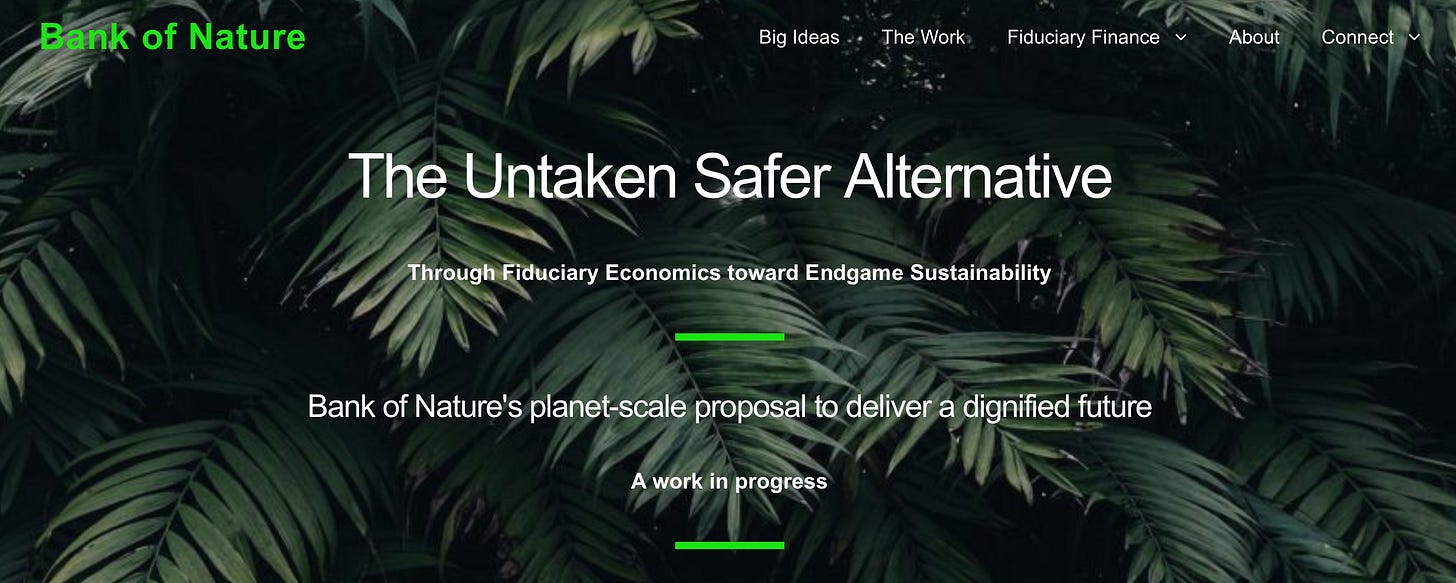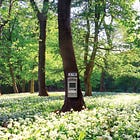Thanks to a generous mention by
in one of his recent columns, we’ve had a substantial uptick in the number of new subscribers. Huzzah! It’s the power of his constituency, and we’re working on that, too, with your help.Like Bill, can you link “The ultimate layaway plan” to your networks, too?
The ultimate layaway plan
With the new interest comes the question “What is Bank of Nature?”
is a program of a 501c3 nonprofit called the Cape Cod Center for Sustainability. The Center’s mission is is to look at “What’s Next?” in sustainability — as in, what makes Buckminster Fuller say loudly from beyond that, “Yep, the world definitely works for 100% of humanity.”[[Yes, we welcome donations and issue receipts.
Or, please consider upgrading here to ‘paid’ to help with our project.
Email: ian@bankofnature.eco for more.]]
What do we do?
Bank of Nature examines climate crisis stuck points and planet-scale strategies to consider who or what else might provide better climate solutions than what’s on offer.
We are a transdisciplinary, cross-silo and unconventional climate think tank
We have authored a Massachusetts Senate Bill in support of our research and are exploring uncharted litigation strategies
We are building an international network of supporters in ecology, sociology, finance, litigation, philosophy, policy and activism
We are defining a post-neoliberal, post-growth fiduciary economy
Alas, we are not yet a bank in the regulatory sense.
Why do we do it?
With our reliance on government policy and corporate sustainability as our climate heroes, we are leaving the problem solving in the hands of the problem makers. We need new ideas.
Historical evidence is crystal clear that neither government nor industry is able or willing to step up to the scale of the crisis. So, what or who is? Fiduciaries — though they aren’t yet acting as the heroes we need. It’s a nontraditional answer that asks people to wade into subject matter what might seem, at first, like arcane legal theory but is having an exciting moment that is overdue.
What’s our progress?
Our first foray into the mainstream is Massachusetts Senate Bill 1644 — An act relevant to pensions, fiduciary standards and sustainable investment. Links here. The bill is introduced and the Joint Committee on Public Service will be giving us recommendations and deciding its next steps. Letters of support are welcome.
The scale of nature/The scale of climate
In my consulting career in sustainability, I worried (and continue to worry) about the lack of a scaled response fitting the scale of the climate crisis.
Bank of Nature suggests nature is, in function, a bank like any other that expects interest on lending and levies interest and penalties on defaulters. Extend the metaphor and climate change is a kind of eviction notice.
But banks manage money. What kind of money are we talking about?
The initiative began as a puzzle to understand why we allow the accumulation of negative externalities in nature. It’s borrowing or rent — a debt owed to nature.
Nature’s piece of the action: Back in 2012, KPMG suggested that 41 cents of every dollar of earnings should go back to nature for the cost of doing business in nature. Let’s say Apple wants to voluntarily hand $41 billion this year (based on 2022 earnings) to nature. There is no mechanism (like Bank of Nature… yet) to remit that nature tax, but wouldn’t that cash be useful in rehabilitating and restoring nature? How would that work when money is no longer a first obstacle to a climate remedy? Does it reverse or stop bleak climate trends? Seems like an opportunity to think differently about the climate crisis.
Fiduciary money: More likely, at least in the time we have to act, is a second financial source that works at the scale of nature and the scale of climate. That’s were we bridge to fiduciary finance, which is a dedicated channel for $30-$60 trillion in global, collaborative money obligated by fiduciary duties and designed to curate a future for pension promisees.
But where, in this economy are the fiduciaries flexing their curatorial power to negotiate a better climate future?







